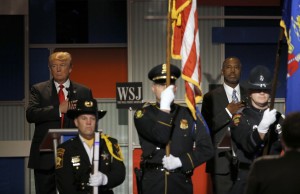
The leading Republican presidential candidates clashed last night over immigration policy, military spending and other emotional issues, showing the party’s fault line between rigid conservatism and mainstream practicality.
The two-hour debate spotlighted the rift between the outsider candidates and “establishment politicians” over how strictly to enforce immigration laws and whether to provide a pathway to legal status for the country’s more than 11 million undocumented immigrants or deport them.
While several other candidates, like Senator Marco Rubio (Fla.) and the retired neurosurgeon Ben Carson, received a pass from the moderators on immigration, Gov. Kasich (Oh.) took on the issue directly after Donald Trump (N.Y.) defended his plan to build a wall along the Mexican border and to identify and deport some 11 million people.
“Think about the families; think about the children,” Kasich said. “Come on, folks, we know you can’t pick them up and ship them across the border. It’s a silly argument. It’s not an adult argument.”
Trump, whose counterpunches were a memorable part of his early debate performances, replied coolly at first, citing President Dwight D. Eisenhower’s approach to deporting immigrants in the 1950s.
“You don’t get nicer; you don’t get friendlier,” Trump said. “We have no choice. We have no choice.”
But Kasich stayed on the attack. “Little false little things, sir, they really don’t work when it comes to the truth,” he said.
Former Gov. Jeb Bush (Fla.) then tried to pounce. He hammered Trump, his longtime rival in the race, for suggesting that he be allowed to speak — “What a generous man you are” — and warned that Trump’s harsh proposals would drive Hispanic voters to support the Democratic candidate Hillary Rodham Clinton.
“They’re doing high-fives in the Clinton campaign right now when they hear this,” Bush said.
Last nights debate also revived a long-simmering dispute over the size and role of the U.S. military, with Sen. Rand Paul (Ky.) warning of the potential adverse fiscal effects of increased defense spending and Sens. Rubio and Ted Cruz (Tex.) advocating a more muscular American military presence in the world.
“Marco, how is it conservative to add a trillion-dollar expenditure for the government that you’re not paying for?” Paul asked.
Rubio responded by calling Paul “a committed isolationist,” and won one of the loudest ovations of the night by defending American leadership.
“I know that the world is a safer and better place when America is the strongest military power in the world,” Rubio said.
However, Paul did not relent in the face of the applause, responding, “I don’t think we’re any safer from bankruptcy court,” and asking Rubio how he could be “a conservative and be liberal on military spending.”
Cruz then interjected, saying, to evident approval from the crowd: “You think defending this nation is expensive? Try not defending it.”
The Texan also found a creative way to link two common Republican concerns — illegal immigration and the purported liberal bias of the media — when he suggested that coverage of border security would be much different if people entering the United States illegally held “journalism degrees” and were going to drive wages down in the news industry.
Overall, however, the debate was a relatively intellectual affair. In a marked departure from the three previous debates, Tuesday’s questions prodded the candidates to explain their positions on such substantive issues as tax policy, the minimum wage and trade treaties, rather than draw contrasts with one another.




